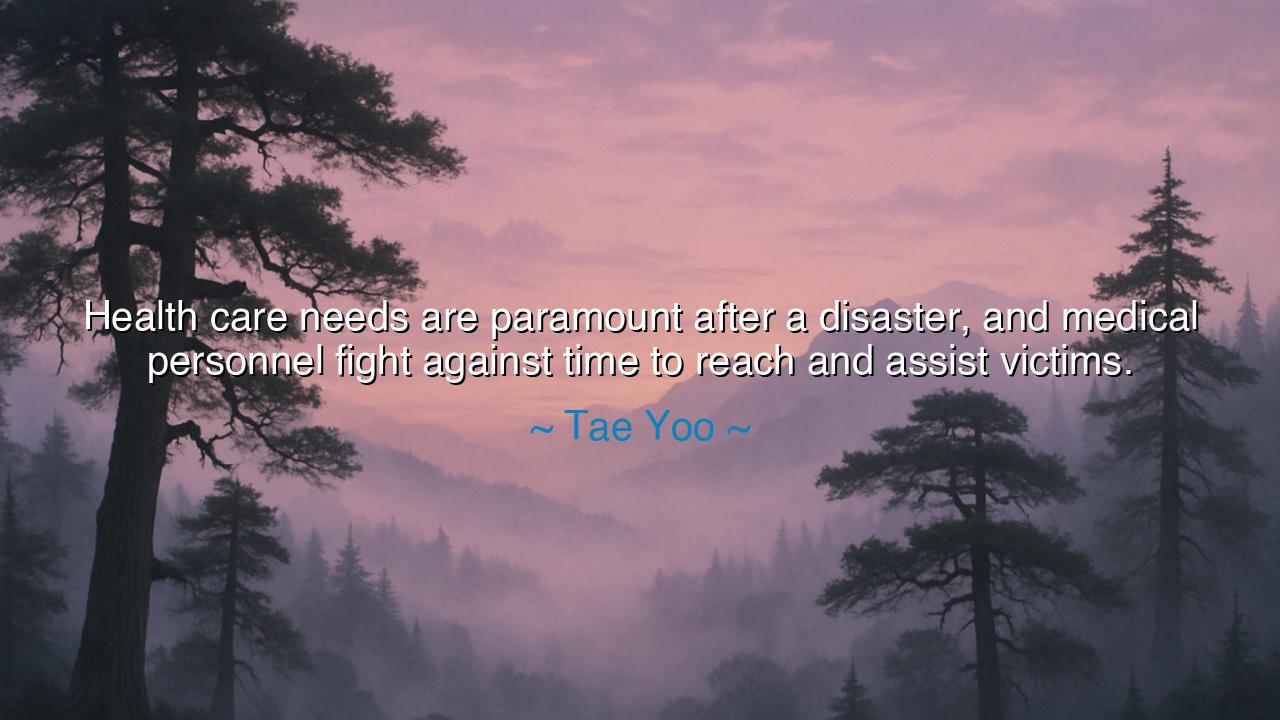
Health care needs are paramount after a disaster, and medical
Health care needs are paramount after a disaster, and medical personnel fight against time to reach and assist victims.






The words of Tae Yoo speak like a flame carried through the storm: “Health care needs are paramount after a disaster, and medical personnel fight against time to reach and assist victims.” In these few lines lies the heartbeat of humanity—the struggle between chaos and compassion, between devastation and the unyielding will to heal. They are words that honor not only the physicians and nurses who labor in the aftermath of tragedy, but the eternal truth that in the face of destruction, the first and greatest duty of humankind is to preserve life. Her words remind us that while nature and fate may strike without mercy, it is human mercy that rises in response.
From the dawn of civilization, disasters have tested the strength of human compassion. When the earth trembles, when the waters rise, when fire devours or wind rends the land, the instinct to flee is natural—but the medical worker runs toward the suffering. Tae Yoo’s quote gives voice to that sacred bravery, that calling which transcends all borders and creeds. It is a truth older than empires: that healers are the torchbearers of civilization. They move through rubble and ruin, bringing not only medicine but hope—an invisible remedy more powerful than any drug.
History offers countless tales that echo her words. In 2010, when the great earthquake struck Haiti, the world watched as cities crumbled and lives were buried beneath stone. Yet amid that ruin, doctors, nurses, and volunteers from across the world descended like a living tide. Many had no sleep for days, operating by lantern light, stitching wounds with trembling hands. Some had come from wealthy nations, others from struggling ones, yet all labored together as if humanity itself were their only country. They fought not against an enemy, but against time—for in every heartbeat of delay, another life slipped away. Their work fulfilled the spirit of Tae Yoo’s declaration: that health care in such moments becomes not a service, but a form of heroism.
But her wisdom speaks beyond the battlefield of catastrophe—it speaks to the nature of life itself. Every human being, in their own way, faces disaster: the sudden illness, the accident, the loss that shakes the soul. In these personal ruins, too, the need for care becomes paramount, and those who tend to the wounded—whether through medicine, kindness, or presence—become healers. The medical personnel of Yoo’s words symbolize not only the doctors who wear white coats, but all who stand beside the suffering, offering strength when despair seems to reign.
Yet there is also urgency in her words—a warning hidden within compassion. To “fight against time” is to acknowledge the preciousness of every moment. In disaster, every second counts, every delay can cost a life. So it is in our daily existence: each moment wasted in apathy or hesitation is a heartbeat lost to the chance of doing good. Yoo’s words remind us that preparedness, organization, and foresight are not luxuries but duties. For though we cannot predict disaster, we can choose to be ready for it—to train, to plan, to strengthen the systems that deliver medical assistance when the unthinkable strikes.
Consider the example of Florence Nightingale, the Lady with the Lamp, who during the Crimean War transformed chaos into care. Amid filth, disease, and suffering, she fought not only against infection but against indifference. Her medical reforms saved thousands, and her example still lights the path for those who heal in crises today. She, too, fought against time, walking from bed to bed through the night, carrying light where death sought to dwell. Her story stands as the ancient echo of Tae Yoo’s truth: that compassion armed with skill is the greatest force against destruction.
And so, my child of understanding, let this teaching dwell within your heart: when disaster strikes—whether in the world or in the soul—let your first thought be not of fear, but of service. Remember that health care is not merely a profession but a sacred trust, and that those who heal, comfort, and rescue stand as the guardians of human dignity. Honor them by learning, by preparing, by giving when others take flight.
For the lesson of Tae Yoo’s words is eternal: that the truest measure of civilization is found not in its monuments or its wealth, but in how swiftly and selflessly it responds to suffering. In every age, disaster will test humanity—but so long as there are those who rush toward the broken, who fight the relentless march of time to bring relief and healing, the spirit of compassion will never perish. And that, above all, is how we endure.






AAdministratorAdministrator
Welcome, honored guests. Please leave a comment, we will respond soon